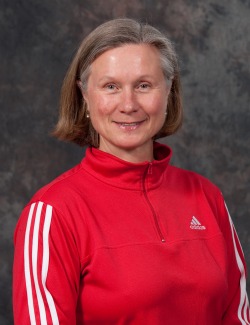
Dr. Vicki Harber believes that physical literacy for girls is a vital facet in the development of the healthy female athlete.
Energetic teacher, vigorous researcher, community leader earns prestigious award.
Vicki Harber has a passion for research, loves to teach - "empowering with the power of education" - and sharing her knowledge well beyond the borders of the University. This year Harber, an exercise physiologist, was awarded a McCalla Professorship, the University of Alberta's most prestigious once-in-a-career award, in recognition of her considerable contribution to research and teaching, for marrying her research to the classroom experience, and disseminating this knowledge through community service.
Nurturing the healthy female athlete is at the core of Harber's research and her recent report, Long Term Athlete Development: the Female Athlete Perspective, penned for Canadian Sport for Life (CS4L) has become a much-sought-after blueprint for parents, coaches and sport administrators wanting to help young female athletes achieve their potential. It's been downloaded over 2000 times from the CS4L website in a matter of months.
During her McCalla year, which affords a break from some teaching, Harber is launching into the next phase of her research - to look at the evidence for physical literacy for young girls, and she and her graduate student, Kelly Drager, and undergraduate student, Teri McTavish, will undertake a review of the literature in this field.
"We are looking for the evidence that physical literacy for girls is the benefit that everyone has suggested it is," Harber says. In a nutshell, "physical literacy" means understanding how to do the fundamental movements used in sport correctly, such as running, jumping, throwing, kicking, sliding, etc. to avoid injury. It's a necessary step, says Harber, because, "The research is all over the place, and we're on rung one."
Harber will use the findings from this review to create impacts in the classroom and in the community. "Part of my McCalla is to create a program that includes best practices for physical activity and physical literacy for young females. My McCalla plan also includes teaching and training university students to deliver the program modules. Then there's an education piece for teachers, parents, coaches, administrators and the athletes themselves," says Harber, noting that her plans extend well beyond the nine months of the McCalla Professorship. "I have arranged to have my teaching pushed to the winter so I have the fall free. I plan to apply for the Teaching and Learning Enhancement Fund to keep this going."
Harber says the aim of the program she wants to create will "immerse young females in positive experiences in physical activity, nurturing a good relationship with food, so they fuel themselves in a way that matches the physical activity they do. The joy piece around that is that food is good. I also want to create an environment that instills self-confidence, courage - that encourages becoming fearless in a safe kind of way," she says, noting that, importantly, the curriculum "will be evidence-based with the science to back it up."
It's a piece of the puzzle Harber says is critical in the healthy development of young females. "The literature tells us that girls will fall away from sport and physical activity at a higher rate compared to boys, so based on that alone, we need to know what we can do to reduce the difference in drop-out rates. There are also some issues that are unique to women being involved in physical activity that warrant attention.
Harber explains, "Girls (who are engaged in physical activity or sport) become more confident and self-worth becomes more grounded in themselves as opposed to getting their self worth (usually) from a male figure in their life." She points to the Women's Sports Foundation report, Her Life Depends On It, which details the adverse impacts of non-participation in sport or physical activity. "So if physical activity enables them to be more intrinsically rewarded and to have that sense of self-assurance, then, particularly through the adolescent years where there are issues of peer acceptance and (pressure to engage in) experimental behaviours such as drug taking, risky sexual behaviours, drinking alcohol - there's less need for that approval.
"Physical activity is a powerful choice. We should not just see it in terms of cardiovascular benefits and musculoskeletal development. It goes way beyond that."
To Harber, what she's doing dovetails with what she holds true. "It's synergistic with all the sport-for-life things that I'm doing," she says. "Being situated at the University I'm able to disseminate CS4L principles and add to the evidence that sport for life is the right thing to do for young females."